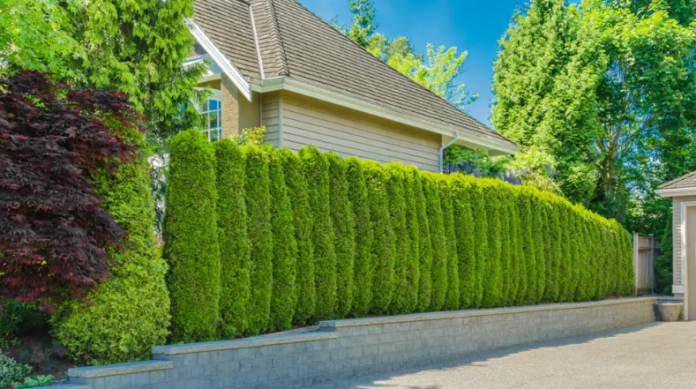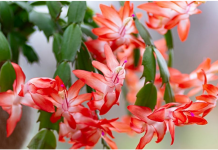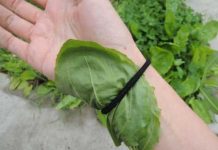Not all fences have to be of the “white picket” variety.
A fence is a classic way to mark the property line of your home, provide a level of privacy, and keep dogs and small humans from running into the street. But if the standard “white picket fence” look isn’t for you, trees and shrubbery can offer a more natural option. If you already have an existing fence, you can add decorative trees or shrubs for additional greenery and privacy. Those without pet and kid responsibilities, though, can opt for the tree- or shrub-only option.
How to plant trees to create a natural fence
Full-grown trees offer the most coverage when it comes to fences that provide privacy, and the most common tree fences are evergreen trees. These lush trees will provide coverage throughout the year, require very little maintenance, and will reach a height of 20 to 60 feet tall when fully grown, depending on the type of tree.
The Thuja Green Giant and American Pillar Arborvitae are fast-growing evergreen trees that do well in direct and indirect sunlight and aren’t affected by deer. You can purchase them at one to two feet tall, and they’ll grow anywhere from three to four feet a year. So you’ll start out with a waist-high fence and have a full-fledged privacy fence in two or three years. A bundle of ten one- to two-foot trees costs about $170 to $180. If you’re looking for a bit more privacy right away (and you’ve got the budget), five-foot trees go for $150 each. Landscaping site Garden Goods recommends planting in a zig-zag pattern four feet apart for optimum privacy.
Another tree-like plant that provides privacy and grows fast is bamboo. Although they are in the grass family, bamboo’s height and look resemble that of trees. The stalks are thin and, when grouped together, create a stick wall with leaves that offer lush coverage. Bamboo is a resilient plant, existing in both hot and cold climates and is fast-growing. A tropical bamboo plant can grow four feet in one day, and overall can reach 40 meters tall (about 113 feet). It’s the perfect tree to pair with a traditional fence, giving a zen garden feeling, along with privacy and safety for pets and little ones.
Garden and nursery site Bamboo Sourcery recommends a planting area at least two feet wide and advises that planter boxes are best for more narrow spaces. When finding the right type of bamboo, planting site Growing a Greener World suggests “clumping bamboo” (sympodial or pachymorph), which have short roots and take up about three to ten feet at full maturity. These bamboo trees are easier to maintain than “running bamboo” (momopodial or leptomorph), which tend to grow fast and unwieldy with roots reaching up to 18 inches deep. Bamboo can cost $22 to $88 per pot, depending on the amount of coverage you need.
How to plant shrubs for privacy
Shrubs are another organic fence option that offers the flexibility of partial to full coverage and privacy. In comparison, trees can grow up to 20 feet tall, and shrubs on average reach about 13 feet in height (even though they can grow to tree-like size). The shrubs also offer a different look to your garden than a classic evergreen—they can produce flowers or berries that bring a pop of color and more of a garden feel to your yard.
Blue princess holly is a festive bush that creates up to 15 feet of privacy, but proper pruning will keep them as short as you like. The deep green leaves sprout small clusters of red berries that give a holiday feel to your garden and a simple accent color to your organic fence. They are hardy plants that survive in any planting zone and do well in hot or cold weather. It is a slow-growing plant, so be prepared for your privacy goals to take some time. These bushes cost about $25 per plant or less when bought in a bundle.
Euonymus shrubs come in all sorts of shapes, sizes, and colors, allowing you to customize the look of your plant fence. The euonymus alatus plant—commonly known as the “burning bush”—is made up of thin sprawling sticks with fiery red leaves. The most common type of euonymus is the golden euonymus shrub, which boasts leathery green and yellow leaves that will create a lush wall of privacy for your yard. The golden euonymus can grow up to 10 feet tall and six feet wide. Good pruning can shape the bush to the height of your choice.
Golden euonymus blossom small greenish-white flowers in the spring, and they are evergreens, so your fence can handle any weather throughout the year. They require watering one to two times a week while they are growing, and once a week when fully grown. A low-dose fertilizer in the spring (and sometimes again in the fall) will keep these bright bushes healthy. This organic fence costs anywhere from $21 to just under $70, depending on the size.










